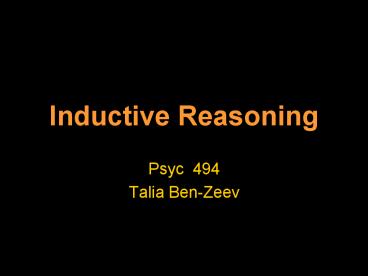Inductive Reasoning PowerPoint PPT Presentation
1 / 21
Title: Inductive Reasoning
1
Inductive Reasoning
- Psyc 494
- Talia Ben-Zeev
2
Inductive Reasoning
- Reasoning from a set of statements to a general
conclusion with some but not a complete degree of
certainty - The oldest living woman in the world lives in
Transylvania - Olga is the oldest woman in the world
- Olga lives currently in Transylvania (deductive)
- The oldest living woman in the world tomorrow
will live - in Transylvania (inductive)
3
Problems with inductive reasoning
1. Evaluating a conclusion is often hard
2. Coming up with a conclusion is often hard
4
The loose view of reasoning
Rips (1990)
Goodmans (1955) New Riddle of Induction
Let grue be the color of an object
at time t if
and only if the object is green and t is before
the
beginning of the year 2,000, or the object
is blue
and t is on
or after the beginning of the year
2,000.
5
Analogical Reasoning
Gick Holyoak (1980)
The Tumor Problem
A doctor is seeing a patient with an inoperable
stomach tumor. The doctor knows that there are
rays that can destroy the tumor, but a ray with
sufficient intensity that would destroy the
unhealthy tissue, would also destroy the healthy
tissue surrounding the tumor. What would be a
way to destroy the tumor without causing
damage to the healthy tissue that surrounds it?
6
Analogical Reasoning
Gick Holyoak (cont)
The Attack-Dispersion Problem
A general who is planning to conquer a fortress.
The generals problem is that the roads leading
to the fortress are mined such that they explode
when a large group of soldiers passes over them,
but they do not explode if the group of soldiers
is small enough. The general decides to solve
the problem of attacking the fortress with a
sufficently large enough army by sending a large
number of small troops along the different roads
that lead to the fortress, and having these troops
meet at the fortress.
7
Analogical Reasoning
Gick Holyoak Exp 4
Both groups received the attack dispersion
problem first and two distractor problems
(for recall) , then were asked to solve the
tumor problem
Group 1 Hint (92)
Group 2 No Hint (20)
8
Danger Confirmation Bias
- Wasons 2-4-6 Task
- You are provided with a set of three
numbers,2, 4, 6. These numbers conform to a
rule. Your task is to discover the rule by
creating new triples. I will respond yes if
your triple conforms to the rule and no if it
does not..
9
Confirmation Bias vs. Positive Test Strategy
C
W
ason
s 2-4-6 T
ask
H
Klayman and Ha
Positive test strategy
C
H
H
C
10
Are People Rational?
11
The Monty Hall Dilemma
Suppose youre on a game show, and youre
given a choice of three doors. Behind one door
is a car behind the others, goats. You pick a
door -- say, No. 1 -- and the host, who knows
whats behind the doors, opens another door --
say, No. 3 -- which has a goat. He then says to
you, Do you want to pick door No. 2? Is it to
your advantage to switch your choice? (Vos
Savant, 1990)
12
mental models
According to Johnson-Laird et al.,(1999),
creating the necessary exhaustive set of models
exceeds working memory demands. Instead, people
create the following models
Door 1 (prize) Door 2 (prize) Door
3 (prize)
13
Working Memory and Mental Models
The collapsing sets hypothesis Increasing
working memory demands can facilitate making a
correct probabilistic choice
P(choice2)
P(choice3)
P(initial choice)
P(initial choice)
14
Experiment 1
Participants were divided into a 3 and a 100
choice conditions, which involved choosing a box
with a cash prize
?
choice
choice
Results
Incorrect (Stay)
Correct (Switch)
3 boxes
15
1
100 boxes
8
8
15
Experiment 1 Correct Probability estimates
without understanding
Median judged probability of winning
People who stayed
People who switched
.50
The only subject who switched did not report an
estimate
3 boxes
12 ss .50, 2 ss .66, 1 subject .67
.50
.50
100 boxes
6 ss .50, 1 subject .01
4 ss .50, 2 ss .99, 1 subject failed to
report
16
Experiment 2 Increasing memory load facilitates
correct responses
The number of boxes were varied from 5 through 10
17
Why dont most people switch?
According to
regret theory
, people tend to stay
because errors of commission are perceived as
being worse than errors of omission (Gilovich et.
al., 1995). People would regret having had the
prize and then giving it up, rather than not
having
the prize in the first place.
18
Experiment 3 Mitigating the effects of regret
W
ill helping people to collapse sets, by making the
partioning of choices more salient (having two
separate
tables), overcome the effects of potential regret?
Step 1
Host chooses a box
and moves it to
other table
Step 2
stay or switch?
19
Experiment 3 Mitigating the effects of regret
incorrect (stay)
correct (switch)
3 boxes
16
16
100 boxes
22
7
20
Conclusion The paradoxical effects of increasing
memory load
i. The probability of switching on the Monty Hall
dilemma increased with the number of options
presented up to an asymptote at a value close to
the capacity of working memory. ii. Despite
this difference in choice, judgments of the
probability of the prizes location were
unaffected by the number of presented
options. iii. Mitigating the effects of regret,
further supported the collapsing-sets hypothesis.
Working memory limitations can be an advantage
in inducing people to make a correct
probabilistic choice.
21
Are People Rational?

